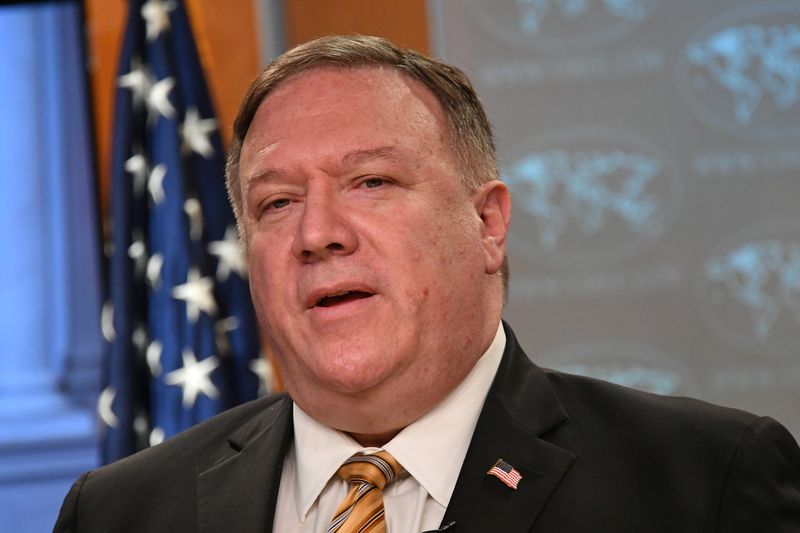By David Brunnstrom
WASHINGTON (Reuters) - The United States began eliminating Hong Kong's special status under U.S. law on Monday, halting defense exports and restricting the territory's access to high technology products as China prepares new Hong Kong security legislation.
The Commerce Department said it was suspending "preferential treatment to Hong Kong over China, including the availability of export license exceptions," adding that further actions to eliminate Hong Kong's privileged status were being evaluated.
"We urge Beijing to immediately reverse course and fulfill the promises it has made to the people of Hong Kong and the world," it said.
The U.S. moves come as the top decision-making body of China's parliament deliberates a draft national security law for Hong Kong that pro-democracy activists fear will be used to eliminate dissent and tighten Beijing's control.
The parliament's standing committee has been widely expected to pass the bill into law before its current meeting ends on Tuesday.
"The Chinese Communist Party's decision to eviscerate Hong Kong's freedoms has forced the Trump administration to re-evaluate its policies toward the territory," U.S. Secretary of State Mike Pompeo said.
He said effective Monday, Washington was ending exports of defense equipment to Hong Kong and would take steps to end export of dual-use technologies to the territory. Such technologies have commercial and military uses.
"The United States is forced to take this action to protect U.S. national security. We can no longer distinguish between the export of controlled items to Hong Kong or to mainland China," Pompeo said.
Kurt Tong, a former U.S. consul general in Hong Kong, told Reuters the U.S. move would not cover a large amount of U.S.-Hong Kong trade as the territory was not a major manufacturing center and its economy was almost entirely services.
He also noted that "'suspend' is different from 'terminate' and is consistent with the conditionality implied."
China's Washington embassy did not immediately respond to a request for comment.
Last month, U.S. President Donald Trump responded to China's plans for the security law by saying he was initiating a process to eliminate the special economic treatment that has allowed Hong Kong to remain a global financial center since its handover by Britain in 1997.
Trump stopped short of calling for an immediate end to privileges, but said the moves would affect the full range of U.S. agreements with Hong Kong, from an extradition treaty to export controls on dual-use technologies and more "with few exceptions."
The U.S. announcements come at a time of intensified U.S. rhetoric against Beijing as Trump campaigns for re-election. Opinion polls have shown voters increasingly embittered toward China, especially over the coronavirus, which began there.
Last week, Pompeo said Washington was imposing visa restrictions on current and former officials of China's ruling Communist Party believed responsible for undermining Hong Kong's autonomy.
Beijing responded on Monday by saying it would impose visa restrictions on U.S. individuals with "egregious conduct" on Hong Kong-related issues.
Analysts say completely ending Hong Kong’s special treatment could prove self-defeating for the United States, which has benefited from the territory's business-friendly conditions.
According to the State Department, 85,000 U.S. citizens lived in Hong Kong in 2018 and more than 1,300 U.S. companies operate there, including nearly every major U.S. financial firm.
The territory is a major destination for U.S. legal and accounting services. In 2018 the largest U.S. bilateral trade-in-goods surplus was with Hong Kong at $31.1 billion.
In 2018, $432.7 million of goods were shipped to Hong Kong under Commerce Department exceptions, mostly relating to encryption, software and technology.

Last year, the State Department approved approximately $2.4 million worth of controlled defense articles and services to Hong Kong government authorities, of which approximately $1.4 million worth was shipped.